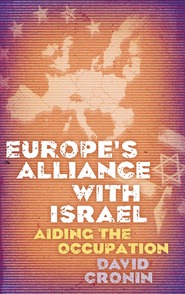War criminal? Welcome to the UK! Politics
New in Ceasefire, Politics - Posted on Wednesday, March 30, 2011 0:00 - 3 Comments
 By David Cronin
By David Cronin
I never wanted to be a policeman, so it’s still a novelty when a friend greets me with the question “Did you arrest anyone lately?”. Without owning a pair of handcuffs, I have tried to bring two political figures to justice.
In February 2011, I invited Avigdor Lieberman to accompany me to a police station, where I had hoped the Israeli foreign minister would be charged with the crime of apartheid. One year earlier, I placed my hand on Tony Blair’s arm and accused him of starting an illegal war against Iraq.
By attempting to put these men under citizen’s arrest, I was following a tradition dating back to medieval Britain, where ordinary people were asked to help apprehend law-breakers by sheriffs. To no surprise, neither attempt was successful: security guards quickly intervened to protect Lieberman and Blair. Yet both drew attention to how scoundrels can masquerade as statesmen.
The first time that I heard of an activist trying to arrest a politician was about 10 years ago when Peter Tatchell confronted Robert Mugabe over the torture of homosexuals in Zimbabwe. While the likelihood of the tactic actually leading to a prosecution is minuscule, it can have a significant impact on public opinion. I am especially pleased that my action against Lieberman led to Israel being described as an apartheid state in many publications. It is seldom that the words “Israel” and “apartheid” can be read in the same sentence in the mainstream press.
Some Palestine solidarity campaigners have suggested to me lately that an attempt should be made to arrest representatives of the Israeli state every time they travel abroad. It is an idea that I support, not least because the West’s leaders regularly accommodate Israel’s inhumanity.
Nick Clegg’s opportunism offers a nauseating case in point. While in opposition, Clegg wrote an opinion piece for The Guardian in January 2009, urging the then Labour government to “condemn unambiguously Israel’s tactics” against the people of Gaza and to impose an embargo on weapons sales to Israel.
Yet in November 2010, Clegg gave a speech to the Liberal Democrat Friends of Israel (a group within his party), during which he spoke approvingly of the current government’s efforts to amend Britain’s law on universal jurisdiction, which is supposed to allow human rights abusers be tried in Britain regardless of where their crimes were committed. Amendments to the law were vital, Clegg (now deputy prime minister) said, to “avoid accusations based on poorly justified grounds against visitors to the UK.”
There was no doubt that the visitors Clegg had in mind were Israeli politicians, concerned about being arrested if they set foot on British soil. Less than two years earlier, Clegg was arguing that those politicians should be condemned unambiguously. Now he believes they should be free to go shopping in Harrods.
Apartheid has been treated as an offence against humanity by the United Nations since 1973. The UN’s convention against apartheid refers to the domination of one racial group over another. Even before that definition was approved, the racist nature of Israel was underscored by Henrik Verwoerd, South Africa’s prime minister in the 1960s. “The Jews took Israel from the Arabs after the Arabs had lived there for a thousand years,” he said. “Israel, like South Africa, is an apartheid state.”
Since joining the ruling coalition in 2009, Lieberman and his party Yisrael Beitenu (Israel Our Home) have made Israeli apartheid even harsher than it had previously been. In late March this year, for example, a “citizenship” bill sponsored by the party passed into law. Clearly directed against the 1.4 million-strong Palestinian minority living inside Israel, it would allow anyone convicted of treason or terrorism to be stripped of their elementary rights. The law is so broad that it can only be interpreted as a bid to snuff out dissent in a country unceasingly depicted by its propagandists as the Middle East’s only democracy.
While the evidence illustrating that Israel is an apartheid state is abundant, our governments refuse to even utter the word apartheid. Absurdly, the European Union deems anyone who calls out Israel as a racist endeavour to be an anti-Semite. The EU’s working definition of anti-Semitism says that describing Israel as racist amounts to anti-Semitism. It is no coincidence that the definition was drawn up in consultation with several Zionist lobby groups, who deliberately conflate criticism of the state of Israel with hatred of Jews in order to scare people of conscience into silence.
Lorna Fitzsimons, a former Labour MP who now runs a lobby outfit called the Britain Israel Communications and Research Centre (BICOM), said during 2010: “Public opinion does not influence foreign policy in Britain. Foreign policy is an elite issue.”
Fitzsimons is wrong to be smug. A campaign of boycott, divestment and sanctions (BDS), coupled with mass public awareness, helped isolate South Africa during the apartheid era and eventually put an end to white minority rule. There is no reason why BDS cannot also bring down Israeli apartheid as it is designed to put economic pressure on those institutions and companies that profit from the pain of the Palestinians.
Once they realise that the occupation of Palestine is bad for business, Israel and its supporters will have to sit up and take notice.
David Cornin is an author, journalist and political activist.
 David Cronin’s book Europe’s Alliance With Israel: Aiding the Occupation is published by Pluto Press (www.plutobooks.com)
David Cronin’s book Europe’s Alliance With Israel: Aiding the Occupation is published by Pluto Press (www.plutobooks.com)
3 Comments
Oren
Tom
Excellent piece and it’s commendable that you have put yourself on the line to try and bring Lieberman and Blair to justice.
Oren: “Israel has in the past, and is in the preset, carrying out many policies that are objectionable, undemocratic and oppressive, and which cause much suffering and humiliation internally, as well as antagonism externally”
The existence of Israel as a state which denies certain rights, priveliges and entitlements to the indigenous people of the territory and bestows them upon people of foreign origin who have, for the most part, settled the land in the past century, is the fundamental sticking point and the reason the conflict is prolonged. We can talk about specific policies here and there until the cows come home, but until the laws regulating property and land ownership according to ethno-religious identity exist, you will have an apartheid state in Palestine. Tolerance and equality may be universal values to some people, but if they were allowed to reign in Israel, the Zionist state would cease to exist overnight.
Oren
Tom,
The indigenous name of Israel is Palestine. The indigenous people of Israel/Palestine are Muslim Palestinians, Jewish Palestinians, and to a lesser extent, Christian Palestinians too. It is true that Jewish immigration to Israel greatly increased Jewish population, but that is all it dod – increase an already existing indigenous population
The source of the problem is the 1947 partition plan by the British and the UN. The plan was good on paper but had little chance of success from the start.
Between 1948 and 1967, Jewish Palestinians, now rebranded Israelis, were busy developing a successful nation-state, as well as defending themselves from constant attack (not from the indigenous Muslim Palestinians, but from neighboring countries). The Muslim Palestinians were not so busy developing a growing nation, but rather defining their new national identity, whilst living as part of Jordan and Egypt.
After 1967 and following further attacks by Jordan, Egypt and Syria, Israel pushed the attacking armies back and took control over the West Bank and the Gaza strip. Now, the Muslim Palestinians were under yet another rule (following the Ottomans, the British and then the Jordanians and the Egyptians). It is the violent struggle that followed, intensifying greatly after 1987, that prompted Israel to make its worst mistake to date of repeatedly increasing oppression and reducing Palestinian personal and national rights.
The Muslim Palestinians are looking at the many successes of the Jewish Israeli state and rightly wanting some of that for themselves too. Do you thinkg there would have been this struggle if Israel were unsuccessful in building a thriving economy in a developed state?
The solution therefore is to simultanuously reduce the violent struggle and increase equality and freedom (and therefore quality of life) to a point where the two populations themselves can decide whether they wish to live side by side, or sharing a land.


David Cronin is a very vocal activist, but unfortunately, his views are somewhat obscured by hatered and narrow-mindedness. His pet hatred of anything remotely connected to Israel has led him to extremism which, in the end, does not serve his own cause, let alone universal values of tolerance and equality.
Israel has in the past, and is in the preset, carrying out many policies that are objectionable, undemocratic and oppressive, and which cause much suffering and humiliation internally, as well as antagonism externally. These policies, without condoning them, did not come about in a vacuum. To change them, it will be necessary to start a gradual change in the social context within which the conflict is thriving.
The social context cannot be changed for the better using armed struggle, or inflamitory talk, or boycots.
What is needed is the kind of positive talk that creates joint innitiatives. People working together on music, art or theatre projects, educational programmes, financial startups, will in turn force the leadership to follow.